|
|
|
Sort Order |
|
|
|
Items / Page
|
|
|
|
|
|
|
| Srl | Item |
| 1 |
ID:
098963
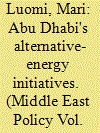

|
|
|
| 2 |
ID:
091543
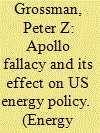

|
|
|
|
|
| Publication |
2009.
|
| Summary/Abstract |
US Policy makers have made continual references to the Apollo Program as a model for development of alternative energy technologies. This model, however, is inappropriate for energy policy, and its use is termed the Apollo fallacy. The goal of the Apollo Program was the demonstration of engineering prowess while any alternative energy technology must succeed in the marketplace. Several Apollo-like energy programs have been tried and all have failed at high cost. It is argued that the use of Apollo has political benefits but that it is detrimental to the adoption of potentially effective energy policies.
|
|
|
|
|
|
|
|
|
|
|
|
|
|
|
|
| 3 |
ID:
096083
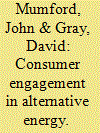

|
|
|
|
|
| Publication |
2010.
|
| Summary/Abstract |
The introduction of alternative energy requires collaboration between consumers, energy suppliers and regulators. A fundamental question is, will consumers engage with this agenda and, in particular, will they trust the institutions sufficiently to enable the collaborations that are needed. Present indications suggest that consumers have little trust in the established institutions and tend to reject such collaborations.
This article presents two case studies which explore the way consumers, regulators and energy suppliers interact in relation to alternative energy projects. It analyses the inter-group interactions from the perspective of symbolic interactionism and discusses the aspects that undermine trust, leading to suggestions for improved trust.
|
|
|
|
|
|
|
|
|
|
|
|
|
|
|
|
| 4 |
ID:
103607
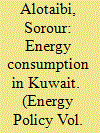

|
|
|
|
|
| Publication |
2011.
|
| Summary/Abstract |
In Kuwait, the consumption of oil, the country's main source of energy, is increasing year by year. In addition to the harsh climate and the rapid economic and construction growth in the country, there are further aspects of energy inefficiency. While 10% of the produced energy was being consumed locally in 1980, this percentage increased to 20% in 2005 and is expected to reach 40% by 2015. If this situation continues, the country will be forced to increase production or reduce exportation. Both options will cause serious problems to the country in meeting future energy demands due to its dependence on oil as a source of income, shortages of other energy resources, and the environmental care of the country.
In this work, we assess the energy situation in Kuwait and its historical, current, and future conditions with a focus on the power plant sector, as it is the major consumer of energy in the country.
Finally, an attempt is made to briefly describe the most realistic and efficient electricity production solutions available and to discuss other alternative resources such as nuclear, solar, and wind energy.
|
|
|
|
|
|
|
|
|
|
|
|
|
|
|
|
| 5 |
ID:
168692
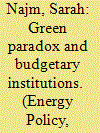

|
|
|
|
|
| Summary/Abstract |
We examine oil production strategies in response to the rise of alternative energy in context of Saudi Arabia and the United States. In a unified simultaneous equation model (SEM), over the period 1976–2015, we investigate the extent to which budget balance behaviour explains the nature of oil production strategies. We find that green regulations have a positive impact on U.S. oil production, while an inverse relationship holds for Saudi Arabia. We argue that the nature of budgetary institutions prevents Saudi Arabia from following a profit maximising behaviour. Saudi Arabia is incentivised to ensure political cohesion through adopting a procyclical fiscal policy. Rather, regulators seem incentivised to channel surplus towards individuals to gain popularity in the United States. A thriving shale oil industry is a plausible rationale for U.S. production strategies. Also known as a weak green paradox, this is problematic for climate change initiatives to reduce global emissions. Climate experts may wish to pay more attention to the supply-side of oil-markets when designing decarbonisation plans. The results challenge conventional wisdom of the green paradox neglecting the role of incentive structure between different types of oil producers.
|
|
|
|
|
|
|
|
|
|
|
|
|
|
|
|
| 6 |
ID:
094874


|
|
|
|
|
| Publication |
2010.
|
| Summary/Abstract |
The energy used for building operations, the associated greenhouse gas emissions, and the uncertainties in future price of natural gas and electricity can be a cause of concern for building owners and policy makers. In this work we explore the potential of building-scale alternative energy technologies to reduce demand and emissions while also shielding building owners from the risks associated with fluctuations in the price of natural gas and grid electricity. We analyze the monetary costs and benefits over the life cycle of five technologies (photovoltaic and wind electricity generation, solar air and water heating, and ground source heat pumps) over three audience or building types (homeowners, small businesses, large commercial and institutional entities). The analysis includes a Monte Carlo analysis to measure risk that can be compared to other investment opportunities. The results indicate that under government incentives and climate of Toronto, Canada, the returns are relatively high for small degrees of risks for a number of technologies. Ground source heat pumps prove to be exceptionally good investments in terms of their energy savings, emission, reductions, and economics, while the bigger buildings tend also to be better economic choices for the use of these technologies.
|
|
|
|
|
|
|
|
|
|
|
|
|
|
|
|
| 7 |
ID:
090535


|
|
|
|
|
| Publication |
2009.
|
| Summary/Abstract |
As the world looks around anxiously for an alternative to oil, energy sources such as biofuels, solar, and nuclear seem like they could be the magic ticket. We need to do everything possible to promote alternative energy.
|
|
|
|
|
|
|
|
|
|
|
|
|
|
|
|
|
|
|
|
|